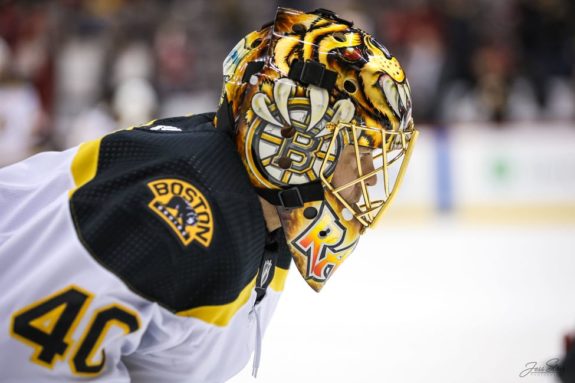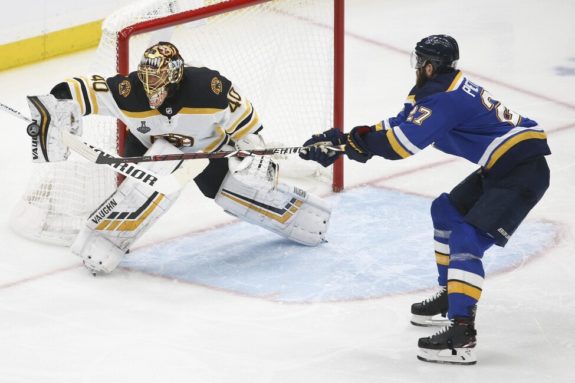For a few years, fans have made Tuukka Rask the scapegoat whenever things go wrong for the Boston Bruins. After their Game 1 loss to the Washington Capitals in their first-round series of the 2021 Playoffs, calls for his head rang throughout the city. Even with a win in Game 2 on Monday, many are calling for rookie Jeremy Swayman to take over though he only has 10 games of NHL experience.
In sports, certain positions carry the blame when things go wrong, like kickers in football or goalkeepers in soccer. Often, they are the last line of hope in a tight game, and their mistakes are most glaring, never mind the many errors from their teammates leading up to that point.

It’s the same for goalies in the NHL. They are the ones who let in the game-winning goal, making it easy to forget every goal they stopped before that or the forwards and defensemen who let that reach the net in the first place.
Rask has been one of the top goaltenders in the NHL for many years, and he has earned his spot between the pipes in Boston. None of the goalies who have come and gone throughout his tenure has been much better, and there haven’t been that many goalies to hit the open market who would have warranted a look over him. Yet, many would argue that the Bruins should have moved him a while ago.
Related: Bruins’ 2021 Playoff Predictions
The Bruins have many problems, and while Rask is not faultless, he isn’t the one standing between the team and a Stanley Cup.
What Happened in the Past
Why have Bruins fans given Rask such a short leash? For years, his critics have argued that he buckles under the stress of a big game. Part of the issue is that he had a very tough act to follow. He took over from Tim Thomas, a Bruins legend, who had one of the best playoff runs by a goalie of all time when they won the Stanley Cup in 2011. Thomas thrived in big moments, and any player who followed him wouldn’t be able to match his career, especially in the playoffs, and would likely seem to struggle by comparison.
Rask became the Bruins starter before the 2012-13 season after Thomas was traded to the New York Islanders. In 36 games that season, he had a 19-10-5 record, a .929 save percentage (SV%) and a goals-against average (GAA) of 2.00. The Bruins made the Stanley Cup Final, and Rask had a .940 SV% and a 1.88 GAA. Despite those numbers, the team lost to the Chicago Blackhawks, who had won the Presidents’ Trophy, and still had their iconic core group of players. Goaltenders across the league struggled against that team throughout the year.
The Bruins also lost in the Stanley Cup Final in 2019 when Rask had a postseason save percentage of .934 and a 2.02 GAA. He also had the best postseason quality save percentage of his career (.792) in the 2019 Playoffs, and goals saved above average of 13. If the Bruins had won the Cup, Rask would have won the Conn Smythe Trophy. He was not the reason they lost to St. Louis Blues.

Some seem to forget that Rask played very well in 2013 and 2019, but they remember that was the starting goaltender when the team lost in two Stanley Cup Finals, which has lowered public perception no matter the stats that back him up.
And then there’s the 2020 Playoffs when Rask left the team for personal reasons before Game 3 of Boston’s first-round against the Carolina Hurricanes. That decision was met with confusion and outrage. Even when news surfaced that at the time he’d been informed that his daughter was sick, some remained resolute in their opinion.
In an unfortunate case of bad timing, he’d been blunt a few days before, in typical Rask fashion, about it being hard to be motivated for the playoffs in the bubble. Some still believe that he made up his daughter’s illness as an excuse because he didn’t want to play. Adding fuel to the fire were reports from October 2020 that the Bruins had gauged interest in a potential trade for him, just a few short months after the team’s second-round exit from the 2020 Playoffs.
What Went Wrong in Game 1
Game 1 was not great for the Bruins. Rask probably should have been able to stop Nic Dowd’s overtime goal.
But that doesn’t mean that the loss was completely on Rask. He made 29 saves on 32 shots for a save percentage of .906. In comparison, the rest of the team only managed 22 shots against Capitals goalie Craig Anderson, who replaced starter Vitek Vanecek after he suffered an injury on the Jake DeBrusk goal in the first period. Anderson, who turns 40 this week, had only played in four games during the regular season.
Related: 3 Takeaways From Bruins’ Game 1 Loss to the Capitals
Without shots on net, it doesn’t matter how many stops a goalie makes. Marchand and Bergeron had only one shot between them and the Bruins’ top line was a non-factor in the game. Surprisingly, the bottom-six forwards were much more impressive then the top-six.
Even though Game 2 resulted in a win and they got more shots off, Boston still has problems with their defense and the power play. But, this is a team sport, and everyone needs to work together; wins and losses are never entirely on one player.
Rask is Still the Guy in Net
Rask shouldn’t be the biggest concern after the first two playoff games. Yes, he should have stopped that final goal in Game 1, but the bigger issue is that the Capitals are playing a very similar game to that of the Blues in 2019, and the Bruins still don’t have much of an answer for it. Despite their recent win, they have a lot to improve on if they expect a deep run. Washington has played with an urgency and fire that the Bruins have struggled to match. It won’t matter what Rask does in goal if the rest of the team can’t get it together.
Related: Bruins’ 2020-21 Season Grades By Position
At the end of the day, Rask’s stats and accomplishments should speak for themselves. He has a career regular-season .921 SV% and 2.28 GAA, and in the postseason, he has a .926 SV% and 2.21 GAA. He won the Vezina Trophy in 2014 and finished second in voting as recently as 2020. He’s finished in the top ten of voting five times. He made the 2013-14 First All-Star Team and the 2019-20 Second All-Star Team (as voted on by the Professional Hockey Writers Association). He also won the William M. Jennings Trophy in 2020 for the goalkeeper(s) with the fewest goals scored against in a minimum of 25 regular-season games.

This season, where Rask faced injuries and a compressed schedule due to the pandemic, he still managed a 15-5-2 record, a .913 SV%, a 2.28 GAA, and two shutouts. He also reached his 300th career win to rank 32nd on the NHL’s all-time career regular-season win list. He ranks sixth in career wins amongst active goalies.
The eye test works too. In both playoff games against the Capitals, the defense and forwards left Rask out to dry. He faced odd-man rushes and made saves on most of them. Again, he can be criticized for missing some of those goals, but the Bruins wouldn’t have made it to overtime in Game 1if Raks hadn’t stepped up his game in the third period. Putting the bulk of the blame on his shoulders is unwarranted.
In last night’s game, he made 36 saves on 39 shots, but at least one goal he should have saved. Yet, his goaltending wasn’t the Bruins’ biggest problem. It might be easier to blame Rask than discuss how little the top line contributed in Game 1, or the defense’s inability to stop an odd-man rush in either game, or the troubles on the power play. The Bruins have a lot of issues. Rask’s goaltending should not be the main focus of discussion heading into Game 3 at the TD Garden on Wednesday.